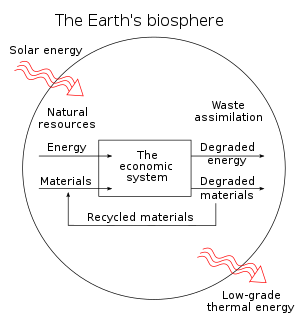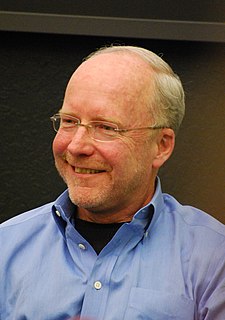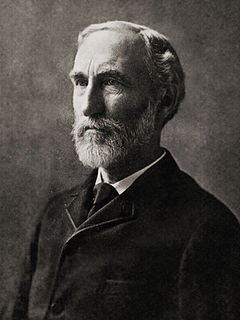A Quote by Herman E. Daly
The laws of thermodynamics restrict all technologies, man's as well as nature's, and apply to all economic systems whether capitalist, communist, socialist, or fascist. We do not create or destroy (produce or consume) anything in a physical sense- we merely transform or rearrange. And the inevitable cost of arranging greater order in one part of the system (the human economy) is creating a more than offsetting amount of disorder elsewhere (the natural environment).
Quote Topics
Amount
Anything
Apply
Arranging
Capitalist
Communist
Consume
Cost
Create
Creating
Destroy
Disorder
Economic
Economic System
Economic Systems
Economy
Elsewhere
Environment
Fascist
Greater
Human
Inevitable
Laws
Man
Merely
More
Natural
Natural Environment
Nature
Order
Part
Physical
Produce
Rearrange
Restrict
Sense
Socialist
System
Systems
Technologies
Than
Thermodynamics
Transform
Well
Whether
Related Quotes
The fundamental differences between Marxian and traditional orthodox economics are, first, that the orthodox economists accept the capitalist system as part of the eternal order of Nature, while Marx regards it as a passing phase in the transition from the feudal economy of the past to the socialist economy of the future.
Capitalism is very far from a perfect system, but so far we have yet to find anything that clearly does a better job of meeting human needs than a regulated capitalist economy coupled with a welfare and health care system that meets the basic needs of those who do not thrive in the capitalist economy. If we ever do find a better system, I'll be happy to call myself an anti-capitalist.
Man is merely a frequent effect, a monstrosity is a rare one, but both are equally natural, equally inevitable, equally part of the universal and general order. And what is strange about that? All creatures are involved in the life of all others, consequently every species... all nature is in a perpetual state of flux. Every animal is more or less a human being, every mineral more or less a plant, every plant more or less an animal... There is nothing clearly defined in nature.
It has always seemed to me that the social order was implicit in the very nature of things, and required nothing more from the human spirit than care in arranging the various elements; that a people could be governed without being made thralls or libertines or victims thereby; that man was born for peace and liberty, and became miserable and cruel only through the action of insidious and oppressive laws. And I believe therefore that if man be given laws which harmonize with the dictates of nature and of his heart he will cease to be unhappy and corrupt.
In order to survive, all systems must evolve by providing greater and greater access to the currents that flow through them. This applies to all physical, biological and social systems that survive and thrive.... But let’s take that one step forward... the systems just described are ... constantly evolving. This suggests another design principle: ... design for evolution rather than creating a static design optimizing for the present.
The axioms of physics translate the laws of ethics. Thus, "the whole is greater than its part;" "reaction is equal to action;" "the smallest weight may be made to lift the greatest, the difference of weight being compensated by time;" and many the like propositions, which have an ethical as well as physical sense. These propositions have a much more extensive and universal sense when applied to human life, than when confined to technical use.
Entropy is one of the laws of thermodynamics. It's a physical law that says everything in nature is moving from order to disorder. In our lives this same principle is at work. As time moves on, things break down as we make mistakes. This is the 'letdown' every person experiences because of sin. For Christians this concept doesn't end there because we realize God's 'beautiful' mercy and grace restores the order in our lives.
Understanding human nature must be the basis of any real improvement in human life. Science has done wonders in mastering the laws of the physical world, but our own nature is much less understood, as yet, than the nature of stars and electrons. When science learns to understand human nature, it will be able to bring a happiness into our lives which machines and the physical sciences have failed to create.
Among civilized and thriving nations, on the contrary, though a great number of people do no labor at all, many of whom consume the produce of ten times, frequently of a hundred times more labour than the greater part of those who work; yet the produce of the whole labour of the society is so great, that all are often abundantly supplied, and a workman, even of the lowest and poorest order, if he is frugal and industrious, may enjoy a greater share of the necessaries and conveniencies of life than it is possible for any savage to acquire.
The Laws of Nature are just, but terrible. There is no weak mercy in them. Cause and consequence are inseparable and inevitable. The elements have no forbearance. The fire burns, the water drowns, the air consumes, the earth buries. And perhaps it would be well for our race if the punishment of crimes against the Laws of Man were as inevitable as the punishment of crimes against the Laws of Nature -were Man as unerring in his judgments as Nature.
Those rights, then, which God and nature have established, and are therefore called natural rights, such as life and liberty, need not the aid of human laws to be more effectually invested in every man than they are; neither do they receive any additional strength when declared by the municipal laws to be inviolate. On the contrary, no human legislature has power to abridge or destroy them, unless the owner shall himself commit some act that amounts to a forfeiture.
'Environment' is not an abstract concern, or simply a matter of aesthetics, or of personal taste - although it can and should involve these as well. Man is shaped to a great extent by his surroundings. Our physical nature, our mental health, our culture and institutions, our opportunities for challenge and fulfillment, our very survival - all of these are directly related to and affected by the environment in which we live. They depend upon the continued healthy functioning of the natural systems of the Earth.
The laws of thermodynamics, as empirically determined, express the approximate and probable behavior of systems of a great number of particles, or, more precisely, they express the laws of mechanics for such systems as they appear to beings who have not the fineness of perception to enable them to appreciate quantities of the order of magnitude of those which relate to single particles, and who cannot repeat their experiments often enough to obtain any but the most probable results.




































